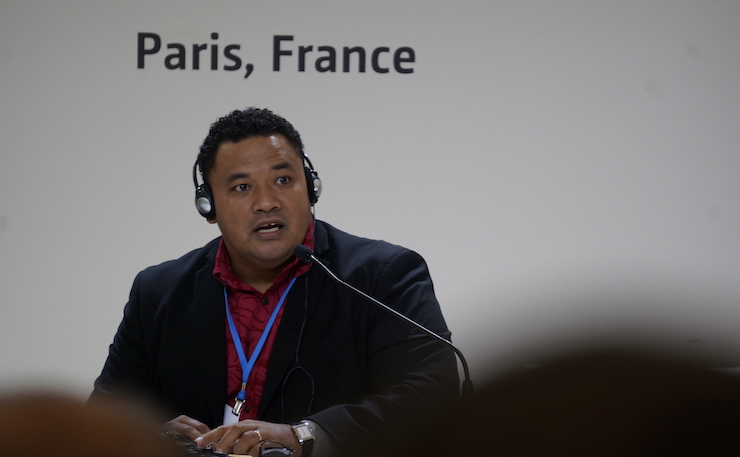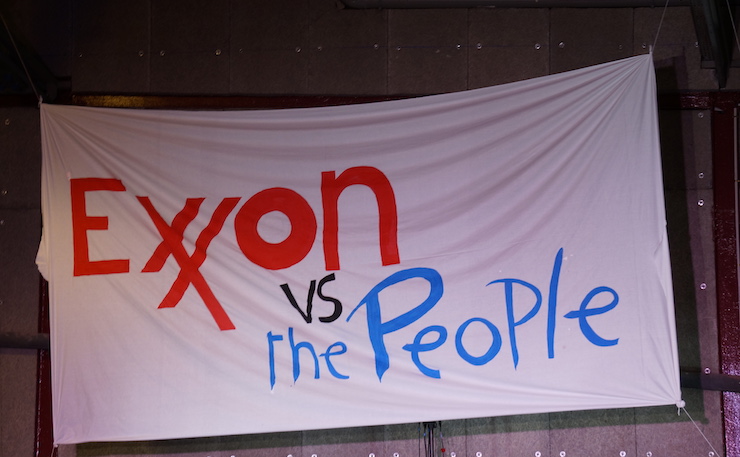Behind the scenes, developing nations and those facing an existential threat from a warming planet are working on a problem no one wants to acknowledge. No matter the outcome of the Paris climate conference, some of the damage of the climate change is already locked-in. Thom Mitchell, New Matilda’s environmental reporter, has this report from Paris.
The industrialisation of now-rich countries has bequeathed saline, flooded and increasingly useless soils to Maina Talia. “We have lost a few islands to the sea,” he says. “Most of the others during high tide are unfit for cultivation.”
The fish are disappearing. It’s cheaper to buy them in cans shipped from Australia or Fiji than at the market. A bigger market has taken hold, and for the oceanic folk of Tuvalu, in the South Pacific, practicing this aspect of their culture demands ever-increasing amounts of time, energy and, ironically, petrol.

Earlier in the week, after jetting into international climate negotiations in Paris, Barack Obama labelled himself an ‘island boy’. The American President may have grown up in Hawaii, but Talia still lives in Tuvalu, and he’s fighting countries like the United States for his ability to continue to do so.
A climate activist based on the low-lying nation’s largest island, Vaitupu, Talia told a well-attended side event at the United Nations talks that “the loss of culture, heritage and land, to us, is equal to death”.
That being the case, just under 11,000 Tuvaluans are on life-support because of the unrelenting support people like Obama have shown the fossil fuel industries that power developed economies.
But medicine can be expensive, and the rich nations which dominate international diplomacy have so far avoided the crucial question of who will pay for the already dire consequences of an increasingly hostile climate now presenting as an existential menace to a growing number of the global poor.
“The United States has not wanted to deal with loss and damage from climate change because they have not wanted to pay,” Julie-Anne Richards of the Climate Justice Programme said at the same side event Talia was addressing. “But they’re not alone; Japan, Switzerland, Australia and others have joined them.”
“Malcolm Turnbull talked big in his speech on Monday,” Richards told New Matilda. “He talked about the vulnerability of Australia’s Pacific Island neighbours, and yet Australia has not put anything on the table”.
In Tuvalu, Talia said, this much larger and wealthier island is seen as a “big brother”. “They are always behind out back, but most of the time they turn around,” he said. And in the lead up to the Paris climate talks, that’s certainly been the case.
Australia was among the cabal of rich nations, along with others in the European Union and the United States, that offered no proposal for how to compensate developing countries which have done next to nothing to contribute to the greenhouse effect, but are grappling with its grotesque consequences.
As Richards put it, “loss and damage is about the worst impacts of climate change and at the moment they’re hitting poor and vulnerable communities hardest, and they’re being forced to pay for it themselves”.
But their governments are pushing hard for a section in the Paris climate accord which commits countries like Australia to help developing nations cope with climate impacts that are already occurring, or already locked in.
“There’s really three pillars when we think about responding to climate change,” Oxfam’s global warming specialist Dr Simon Bradshaw told New Matilda.
“There’s obviously mitigation, the urgent task of driving down emissions ultimately in line with keeping temperatures down in order to avoid the worst affects of climate change.
“There’s adapting to the impacts that can’t be avoided, and making sure that the crucial need for sufficient funding for adaptation is met.
“But then, it’s clear that because of the delay in us reducing emissions, and the inadequacy of support to help communities to adapt, that there are also residual impacts that exist already and which we’re going to continue to see, which is where we talk about ‘loss and damage’.”
“Adaptation and loss and damage are a little bit separate. We need to do all we can to adapt, to help communities build their resilience to climate change, but when we have communities facing the prospect of losing land, home and livelihood, no matter what adaptation measures are taken, there needs to be approaches to deal with that.”
What that looks like remains somewhat cloudy, because the conversation has been studiously avoided. But it’s taking shape in Paris around a few key elements; finance, a migration facility of some kind for climate-displaced people and technological and capacity building support to help cultivate awareness of climate change, better understand its impacts on specific locations and communities a response to both slow-onset events like desertification and natural disasters.
The large group of more than 130 developing nations known as the G77, with China as its heavyweight member, put forward a proposal after preliminary talks leading into Paris in October which includes those components. Yesterday the proposal made it into a significant redraft of the climate deal being negotiated in Paris, without being scarpered by the nations that have typically resisted a move towards developing a response on loss and damage.
One aspiration has been rubbed out, though. Language around compensation and liability which had featured in earlier proposals from climate-vulnerable developing nations that sit within the broader G77 grouping has been watered down.
“When you look at the G77 proposal as a whole there is no word on compensation and liability, so they have moved their position beyond that…my sense is they don’t want to fight on that particular issue,” the World Wildlife Fund’s Sandeep Chamling Rai told journalists yesterday.
It’s not a “sticking point” this time around, he said. Probably because it’s a ‘red line’ for countries like Australia, America and the European Union. “We are still hearing about bilateral [meetings]behind the scenes, meetings with G77, European Union and the United States and others, but there’s nothing on the table yet from those countries,” Richards said.
On Friday, Dr Bradshaw predicted loss and damage would be “one of those eleventh hour issues that will be decided very late in the negotiations,” when the politicians move in to do the strong-arming that has historically been the real driver of the United Nations’ process around climate change.
Even then, it’s unlikely that any firm commitments will be made. Dr Bradshaw said what may realistically be achieved is “that Paris beds down institutional arrangements”. Richards agreed that was important and viable, because “Paris is the durable agreement”.
“It’s what we’re gong to live with on climate change for the next decades, so the deal on loss and damage has to be good,” she said. “It’s an existential issue for many of these countries, [and]I guess it’s feasible that within the lifetime of the Paris agreement some of these countries might potentially cease to exist.”
Recognising the difficulty in extracting public finance, Richards and a number of others have developed a proposal to “implement the polluters pay principle”, as her colleague at the Heinrich Boell Foundation, Lili Fuhr put it.
They argue for a ‘carbon levy’ on fossil fuel companies, which would allow governments to collect money that would then be deposited into an international fund and distributed to affected communities.
It would be modelled on International Oil Pollution Compensation Funds, which a report outlining the proposal states already “collect levies from companies that ship oil internationally to use as compensation in the incidence of spills”.
Although it’s difficult to determine how much of a given disaster can be attributed to climate change, the report takes the example of the Carteret Island’s 6,000 residents, who are being evacuated to the larger island of Bougainville by its autonomous government and that of Papua New Guinea.
It’s one of the “world’s first organised resettlement movements of forced climate change migrants,” the report says, but the PNG government has found only $900,000 of an estimated $5.3 million needed to address the displacement.
The Roman Catholic Church has provided 80 hectares of land for families to resettle on, but the report seeks a durable solution that will institutionalise some framework for financing loss and damage, not a charitable one. It points out that oil giant ExxonMobil profited to the tune of USD$32.5 billion in 2014 alone by peddling the very products that created the crisis.
“There’s clearly a strong moral case for the fossil fuel industry to pay for the cost of the damage their products are doing rather than the poor,” Richards says. And that’s particularly the case for Exxon, which is under investigation by New York’s Attorney-General for allegedly covering up internal science which proved, perhaps earlier and more clearly than any other findings, what fossil fuel combustion was doing to global weather patterns.

At a separate side event to the Paris talks yesterday – a mock-trial organised by climate activists, authors and journalists, Naomi Klein and Bill McKibbon – yet another first nations activist railing against the impact climate change is having on her people and lands declared that the oil industry and Exxon “have us by the throat”. “I think Exxon are corporate serial killers. They’re murderers,” she said.
But it’s more likely an existing United Nations mechanism which came out of climate talks in 2013, known as the Warsaw International Mechanism for Loss and Damage, will be adapted in some way and incorporated into the Paris agreement.
It remains to be seen whether loss and damage will even get its own section in the deal, though. It may simply be lumped in with adaptation, or left out of the text completely and relegated to some associated document. Analysts say it is critical to ensure a standalone section on loss and damage is created because if it’s not the door remains open for loss and damage to be conflated with adaptation and the associated climate finance, effectively robbing Peter to pay Paul.
It exists as its own article in the latest draft of the Paris agreement, and the G77 proposal is still on the table. Richards said the G77 proposal includes “a kind of generic mechanism for dealing with loss and damage” whereas another proposal, developed by facilitators guiding negotiations on the Paris deal, “kind of embeds the Warsaw mechanism as the institution to handle loss and damage”.
Either would be an important step forward, according to Richards.
Sven Harmeling, a specialist on loss and damage with the Climate Action Network (a sort of peak body for civil society at the Paris talks) told New Matilda “we don’t know yet what the [existing]Warsaw Mechanism will deliver for addressing loss and damage”.
“A weakness is that it does not explicitly entail obligations for parties to address loss and damage that happens to others. That may still be an issue to look at in the context of Paris Agreement, to add provisions to the current text which outline obligations, but which leave it to the future work to detail them.”
Given negotiations on this issue have been stilted at best so far, it seems relatively certain the future of loss and damage in the international response to climate change – and whether people like Maina Talia have a liveable future on their homelands – will be decided behind closed doors by the powerful politicians who have been dodging meaningful responsibility as emissions keep rising.
Donate To New Matilda
New Matilda is a small, independent media outlet. We survive through reader contributions, and never losing a lawsuit. If you got something from this article, giving something back helps us to continue speaking truth to power. Every little bit counts.





